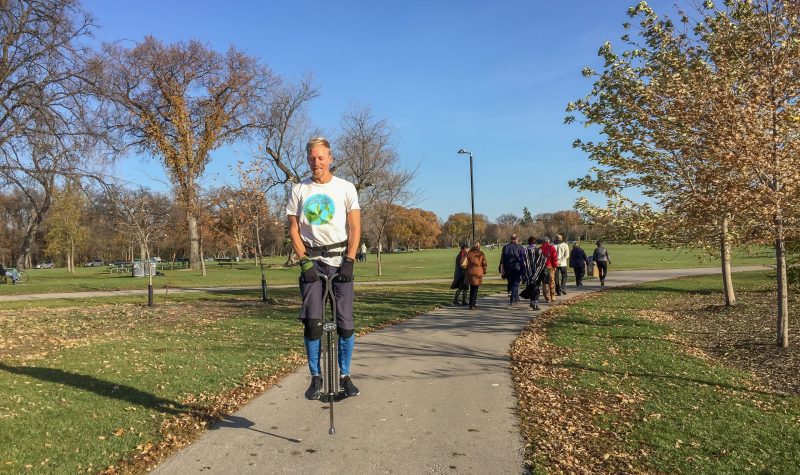After eight years of travelling the globe without a motor, Markus Pukonen has finally arrived home in Canada, where his journey started.
Pukonen is the founder of the non-profit society Routes of Change. The goal of his odyssey and the organization is to promote sustainable travel while making you aware of the impact you have on the world. Pukonen has traveled over 70,000 kilometers over the eight years without a motor.
He came up with the idea while he was fighting forest fires in British Columbia and traveling in the off season. In his travels, he says he saw how his purchasing choices affected the people in other countries. Pukonen says that he fully committed to the idea in his head in 2009 during a rough period in his life.
“I basically was figuring out how I could combine what I am passionate about, and create my dream job. And it was right at that time, at the end of a fire season, that my dad called me up and said he had two weeks to live. And if he did not do some serious chemo, he would die. And on my way home to see him on a plane, the irony is not lost, I formulated this Route of Change plan,” says Pukonen.
During his journey, to keep his CO2 emissions to a minimum, he avoided all planes, trains and automobiles. His dedication for zero emission travel has led him to walk, bike and pogo stick across the world. His fear of travel that used emissions even infiltrated his dreams.
“For the first two years of the journey, I would have nightmares that I would wake up in a motor vehicle. They weren't frequent nightmares, but common enough that it was concerning, because I obviously could not let go of the fear of, you know, messing up my mission,” says Pukonen.
When he was going through North America he had no idea of how he was going to cross the ocean until he got to California. A friend of Pukonen had a zero emission sailboat that they used to get to Hawaii. Dropping off his friend, Pukonen took the boat and sailed for 25 days solo through the Pacific Ocean to Hong Kong.
Landing in Asia brought new worries in his journey as the ports were not designed for a small sailboat. Every port was filled with huge ships that cost millions of dollars, and Pukonen says he was worried about hitting them as it would have ended his journey early.
Through his travels, Pukonen says that he learned that the world is no longer accommodating to travelers without a motor.
“The hardest part is the fact that the world is no longer designed to move around without motors and highways, and roads and border crossings and bureaucracy are all sort of up against me,” says Pukonen.
He says that when it came to crossing borders, there was a large difficulty going through country-to-country. Pukonen says they all thought he was a “crazy lunatic out to get himself killed.” To ease the tensions at every border he had a “get out of jail free card”: a friend of his was elected to parliament and wrote him an official letter to help him get through all borders. He says that this writ of passage made travel flawless.
After seven and a half years of world travel, he finally touched down back in North America. While making his way through the United States, Pukonen found that his money no longer stretched as far as it did elsewhere.
“I cannot afford to live in North America; my annual budget has been under $20,000. And so I spent more than a quarter of that in my first couple months, or my first month in the United States, just because the Canadian dollar exchange rate was really bad too,” says Pukonen.
His voyage ended with a walk to Woodbine Beach with his friends and family he has not seen in a long time. After eight years, he made it back home with only his body feeling older, says Pukonen.
“It was a very bizarre feeling. The emotion had hit me before I crossed the border into Canada, I started crying at the border. And I wasn't even seeing any friends or family there. So Saturday, it was almost just so overwhelming that I did not even let the emotion out because it was so intense. It was at a loss of words. And it was wonderful,” says Pukonen. “The ending and accomplishing this goal I had sort of accepted that that was less important than just living the moment. At the same time, it was one of the most important moments of the whole journey, not because I finished the journey, but because I was with my loved ones.”
Listen to the story below:


